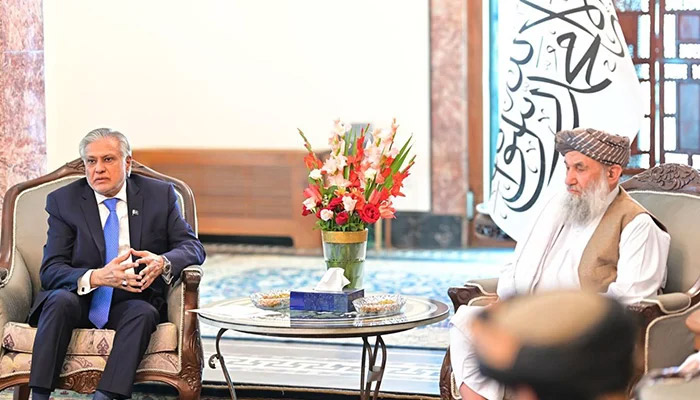ISLAMABAD: Deputy Prime Minister and Foreign Minister Ishaq Dar on Friday announced that Pakistan would upgrade its diplomatic mission in Kabul by appointing an ambassador in place of a Chargé d’Affaires.
Taking to X, Dar said that Pakistan-Afghanistan relations were on positive trajectory after his “very productive” visit to Kabul on April 19.
“I am confident this step would further contribute towards enhanced engagement, deepen Pak-Afghan cooperation in economic, security, CT & trade areas and promote further exchanges between two fraternal countries,” he stated.
Pakistan and Afghanistan have embassies in each other’s capitals but they are led by charge d’affaires, not ambassadors.
China was the first country to accept an ambassador from the Taliban-run administration in Kabul though it does not formally recognise its government. Several other states, including the United Arab Emirates (UAE), followed.
The two nations share a porous border spanning around 2,500 kilometres with several crossing points which hold significance as a key element of regional trade and relations between the people across both sides of the fence.
The issue of terrorism remains a key issue for Pakistan which has urged Afghanistan to prevent its soil from being used by groups such as the TTP to carry out attacks inside the former’s territory.
However, days earlier, a commander of the Afghan Taliban, Saeedullah Saeed, warned terrorists of Fitna al-Khwarij against fighting the Pakistan forces, conducting attacks in the name of Jihad.
Earlier this month, China hosted an informal meeting between Islamabad and the Afghan Taliban administration, wherein Chinese Foreign Minister Wang Yi says it was decided between the two nations to upgrade their diplomatic ties.
The neighbours agreed in principle to send ambassadors to each other’s country as soon as possible, Yi said after his talks with Afghanistan’s acting foreign minister Amir Khan Muttaqi and FM Dar.
Meanwhile, Islamabad and Beijing also agreed to extend the China-Pakistan Economic Corridor (CPEC) to Afghanistan, reaffirming their commitment to enhancing regional connectivity and economic cooperation.
The key outcomes from the Beijing meeting also included commitments to enhance cooperation in security and counter-terrorism, including joint action against militant groups and external interference and an understanding to formally resume the trilateral process by convening the sixth China-Afghanistan-Pakistan Foreign Ministers’ Dialogue in Kabul.
Tensions appeared to ease after a rare meeting between Muttaqi and Dar in Kabul last month where the Taliban’s acting foreign minister expressed concern over the deportation of tens of thousands of Afghans from Pakistan.
During the meeting, both sides agreed to continuing dialogue in a constructive and positive atmosphere to address bilateral concerns, including security, trade, transit cooperation, and broader ties.





